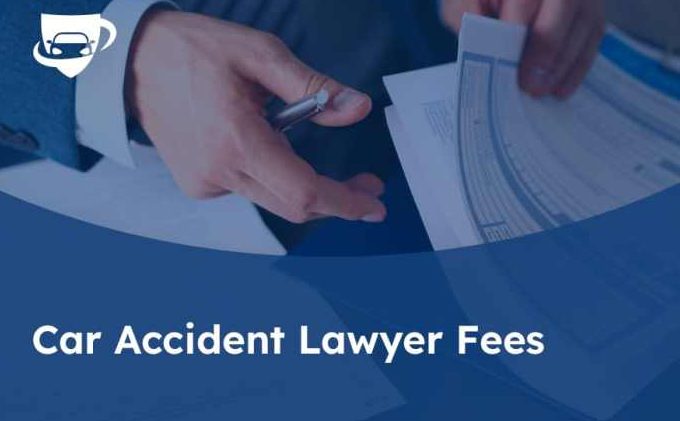Car Accident Lawyer Fees – When you’re involved in a car accident, dealing with injuries, vehicle damage, and lost wages can be overwhelming. Hiring a car accident lawyer can ease some of this burden, but many people are concerned about the cost. Understanding how car accident lawyer fees work can help you make informed decisions and ensure you receive fair representation without financial strain. This guide explains the types of fees, payment structures, and factors influencing costs, so you’ll have a clear picture of your potential legal expenses.
Types of Car Accident Lawyer Fees
Car accident lawyers generally use a few different fee structures depending on the specifics of the case, the lawyer’s experience, and the law firm’s policies. Here’s an overview of the main types:
1. Contingency Fee
In most car accident cases, lawyers work on a contingency fee basis. This means they only get paid if you win your case or receive a settlement. Contingency fees are typically a percentage of the compensation you receive, commonly ranging from 25% to 40%. This structure benefits those who may not have the financial resources to pay upfront legal fees, as payment is only required upon successful resolution of the case.
2. Hourly Rate
Some lawyers charge an hourly rate for their services, where you pay for each hour the lawyer works on your case. This structure is less common for car accident cases but may apply to more complex claims or instances where clients prefer this method. Hourly rates can range from $150 to $500 per hour, depending on the lawyer’s experience and location.
3. Flat Fee
In rare cases, a car accident lawyer may offer a flat fee for specific services, such as drafting documents, handling basic claims, or conducting initial consultations. This type of fee structure is generally more common for straightforward tasks rather than full car accident cases.
How Contingency Fees Work
For car accident cases, the contingency fee model is the most popular and accessible for clients. Here’s how it typically works:
- No Upfront Payment: You don’t pay anything upfront, allowing you to pursue your case without worrying about immediate legal expenses.
- Percentage of Settlement: If your lawyer successfully negotiates a settlement or wins at trial, they receive a percentage of your award, typically around 33%. For instance, if you win a $100,000 settlement and have agreed on a 33% contingency fee, your lawyer would receive $33,000, and you would take home $67,000 (before any additional costs).
- Fee Adjustments: Some lawyers adjust contingency fees based on how the case progresses. For example, they may charge 25% if the case settles quickly and 40% if it goes to trial.
- Deducting Costs: The contingency fee typically covers only the attorney’s fee, not additional expenses incurred while pursuing the case, such as filing fees, medical records, and expert witness costs.
Factors Influencing Car Accident Lawyer Costs
Several factors can impact the cost of hiring a car accident lawyer. Here’s what you should consider:
1. Lawyer’s Experience and Reputation
A more experienced lawyer may charge a higher contingency fee or hourly rate due to their expertise and success rate. Lawyers with a proven track record in car accident cases tend to secure better settlements, potentially justifying their higher fees.
2. Case Complexity
The complexity of your car accident case also affects costs. If there are multiple liable parties, severe injuries, or complicated medical and accident evidence, the lawyer may spend more time and resources on the case, which could increase fees.
3. Potential Recovery Amount
Lawyers may charge higher fees in cases with significant potential payouts, as they anticipate a more extensive time commitment and effort to secure maximum compensation.
4. Geographic Location
Legal fees vary significantly depending on the location of the law firm. Lawyers in major cities or areas with higher living costs typically charge more than those in rural areas.
5. Litigation vs. Settlement
Cases that settle out of court tend to be more cost-effective since they don’t require as much preparation or court representation. However, if the case goes to trial, you may incur additional expenses, which can impact the contingency fee or add extra hourly billing time.
Pros and Cons of Hiring a Car Accident Lawyer on Contingency
Using a contingency fee model has advantages and potential drawbacks:
Pros
- No Upfront Costs: You don’t need to pay anything to start your case, which can be crucial if you’re facing financial hardships after an accident.
- Motivated Representation: Lawyers on contingency only get paid if they win your case, incentivizing them to maximize your compensation.
- Accessible Legal Help: This model allows you to access legal services even if you lack immediate funds.
Cons
- Potentially Higher Fees: Contingency fees, especially in high-payout cases, can be costly. Sometimes, a higher percentage of your settlement goes to the lawyer compared to an hourly fee structure.
- Reduced Recovery: The more complex the case, the higher the contingency fee, which could reduce your final take-home amount after lawyer fees and additional costs are deducted.
- Less Flexibility: Some lawyers may be unwilling to negotiate contingency fees, limiting options for clients who prefer lower rates.
Other Potential Legal Expenses
In addition to the primary fee structure, there are often other expenses involved in a car accident case. These can include:
1. Court Filing Fees
If your case goes to trial, there are often court filing fees associated with submitting documents, which can range from $50 to several hundred dollars, depending on your jurisdiction.
2. Expert Witness Fees
In complex cases, lawyers may hire expert witnesses to testify on aspects like accident reconstruction or medical conditions. Expert fees can vary significantly, from a few hundred to several thousand dollars per expert.
3. Medical Record Costs
Obtaining copies of medical records and other necessary documents often incurs additional fees. The total cost will depend on the number of records needed and any administrative costs set by the hospital or healthcare provider.
4. Investigation Costs
Some cases require a detailed investigation, including gathering witness statements, examining accident scenes, or obtaining additional evidence. If private investigators are involved, their costs will be factored into the total legal expenses.
5. Travel and Miscellaneous Costs
Travel costs, document postage, and other minor expenses can also add up, especially if the lawyer needs to travel for court appearances or depositions.
FAQs on Car Accident Lawyer Fees
Q: Do I still pay my lawyer if I lose my car accident case?
A: If you’re working with a lawyer on a contingency basis, you typically don’t pay anything if you lose. However, you may still be responsible for covering additional costs like court fees or expert witness expenses, depending on your agreement.
Q: Can I negotiate my lawyer’s fees?
A: Yes, you can discuss fee structures and try to negotiate contingency percentages. Some lawyers may be open to lowering their fee or adjusting payment terms, especially if you have a strong case.
Q: Is it worth hiring a lawyer for a minor car accident?
A: If you’ve sustained significant injuries, faced property damage, or need help dealing with insurance, hiring a lawyer can be beneficial even in minor accidents. Legal representation ensures you receive fair compensation and protects your interests if the insurance company tries to downplay your claim.
Q: What’s a reasonable contingency fee for a car accident lawyer?
A: The average contingency fee ranges from 25% to 40% of the settlement amount. Some lawyers may adjust this percentage based on case specifics, but you should aim for a percentage within this range.
Conclusion: Navigating Car Accident Lawyer Fees
Hiring a car accident lawyer can significantly impact your chances of receiving fair compensation, but understanding the cost is essential for making informed choices. The contingency fee model makes legal services accessible, especially for clients who may not have the funds to pay upfront. However, it’s crucial to clarify all aspects of your agreement with your lawyer, including potential additional expenses.
Carefully weigh the benefits of legal representation against the associated fees. With a clear understanding of lawyer fees and legal expenses, you’ll be better prepared to move forward, knowing what to expect financially and legally in your car accident case. If you’re seeking more resources on understanding lawyer fees, consult Nolo’s Guide to Legal Fees and Costs for additional information on navigating legal expenses.




